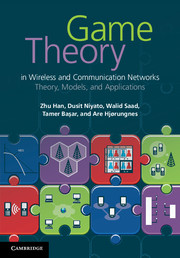Book contents
- Frontmatter
- Contents
- Preface
- 1 Introduction
- 2 Wireless networks: an introduction
- Part I Fundamentals of game theory
- 3 Non-cooperative games
- 4 Bayesian games
- 5 Differential games
- 6 Evolutionary games
- 7 Cooperative games
- 8 Auction theory and mechanism design
- Part II Applications of game theory in communications and networking
- References
- Index
7 - Cooperative games
from Part I - Fundamentals of game theory
Published online by Cambridge University Press: 25 October 2011
- Frontmatter
- Contents
- Preface
- 1 Introduction
- 2 Wireless networks: an introduction
- Part I Fundamentals of game theory
- 3 Non-cooperative games
- 4 Bayesian games
- 5 Differential games
- 6 Evolutionary games
- 7 Cooperative games
- 8 Auction theory and mechanism design
- Part II Applications of game theory in communications and networking
- References
- Index
Summary
While non-cooperative game theory studies the strategic choices resulting from the interactions among competing players, cooperative game theory provides analytical tools to study the behavior of rational players when they cooperate. In this context, in a cooperative-game scenario, the players are allowed to form agreements among themselves that can impact the strategic choices of these players as well as their utilities. Cooperative games encompass two main branches: bargaining theory and coalitional games. The former describes the bargaining process between a set of players that need to agree on the terms of cooperation, while the latter describes the formation of cooperating groups of players, referred to as coalitions, that can strengthen the players' positions in a game. In this chapter, we examine the key characteristics, properties, and solution concepts of both branches of cooperative games as well as sample applications within wireless and communication networks.
Bargaining theory
Introduction
In economics, many problems involve a number of entities that are interested in reaching an agreement over a trade or the sharing of a resource but have a conflicting interest on how to reach this agreement and on the terms of the agreement. In this context, a bargaining situation is defined as a situation in which two (or more) players can mutually benefit from reaching a certain agreement but have conflicting interests on the terms of the agreement.
- Type
- Chapter
- Information
- Game Theory in Wireless and Communication NetworksTheory, Models, and Applications, pp. 171 - 220Publisher: Cambridge University PressPrint publication year: 2011
- 1
- Cited by



